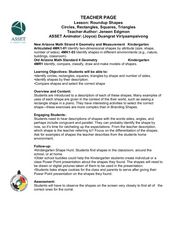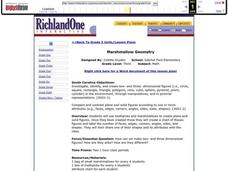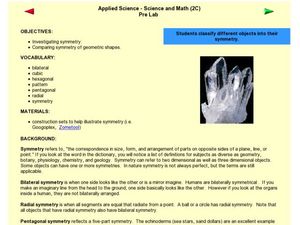Curated OER
Circles, Rectangles, Squares, Triangles
Students identify, compare and classify the various shapes. In this shapes lesson, students listen to descriptions of shapes with words such as sides, angles, congruent, and parallel. Students then give the teacher examples of shapes...
Curated OER
Identifying Similar Triangles
In this identifying similar triangles worksheet, 10th graders solve 6 different types of problem that include identifying and comparing similar triangles. First, they identify the three ways that determine whether two triangles are...
Curated OER
Roping Quadrilaterals
Students explore with quadrilaterals. In this roping quadrilaterals instructional activity, students work in cooperative groups to play the game, "Question, please!" in order to identify, describe, compare and classify quadrilaterals....
Mathematics Vision Project
Geometric Figures
Logical thinking is at the forefront of this jam-packed lesson, with young mathematicians not only investigating geometric concepts but also how they "know what they know". Through each activity and worksheet, learners wrestle with...
Curated OER
Corresponding Parts of Similar Triangles
Here is a lesson that has learners take a look at corresponding parts of similar triangles, ratios of similarity, reductions and enlargements. They'll manipulate the scale factor (r) to observe the changes in similar triangles and then...
Curated OER
Comparing Roots After Rotation of Ninety Degrees
Students conduct an experiment and use different measurements of a single root to illustrate the mechanism of plant movement.
Noyce Foundation
Parallelogram
Parallelograms are pairs of triangles all the way around. Pupils measure to determine the area and perimeter of a parallelogram. They then find the area of the tirangles formed by drawing a diagonal of the parallelogram and compare their...
Curated OER
Marshmallow Geometry
Third graders create 2D and 3D shapes using marshmallows and toothpicks. In this geometry lesson, 3rd graders create their shapes and document the number of faces, edges, corners, angles, and sides. They share one shape and its...
Curated OER
Pythagorean Theorem
Students solve problems using the Pythagorean Theorem. In this geometry lesson, students identify different parts of a right triangle. They use the Pythagorean Theorem to calculate missing angles and sides.
West Contra Costa Unified School District
Congruent and Similar Polygons
What's similar about congruent and similar polygons? Young mathematicians first measure the side lengths and angles of given figures. They use these measurements to determine relationships between side lengths and angles of congruent and...
Everyday Mathematics
Mathematics Within: Slope and Triangles
Learners discover a method for determining the slope of a line by creating and comparing similar triangles. They fold coordinate grids to make three similar triangles then measure the sides to compare the relationships between the...
Cornell University
Constructing and Visualizing Topographic Profiles
Militaries throughout history have used topography information to plan strategies, yet many pupils today don't understand it. Scholars use Legos and a contour gauge to understand how to construct and visualize topographic profiles. This...
National Security Agency
Classifying Triangles
Building on young mathematicians' prior knowledge of three-sided shapes, this lesson series explores the defining characteristics of different types of triangles. Starting with a shared reading of the children's book The Greedy Triangle,...
Curated OER
Finding the Area of an Equilateral Triangle
The problem seems simple: find the area of the equilateral triangle whose sides are each length 1. In fact, this same problem is solved in 8th grade, addressing a different Common Core standard, using the formula for area of a triangle...
Curated OER
Atomic Absorption Determination of Zinc and Copper in a Multivitamin
Advanced lab apprentices prepare zinc and copper solutions to which they will compare the same minerals from a multivitamin. Using absorption spectroscopy, they analyze the contents of the multivitamin for concentration. This lab can be...
Arizona State University
Tricorn Triangles
Help your learners examine triangles. Pupils explore the different sizes and measurements of triangles. They discover triangles can be isosceles or scalene, and examine the attributes of triangles. Here is the website where you can find...
Virginia Department of Education
Similar Triangles
Pupils work in pairs to investigate what it takes to prove that two triangles are similar. They work through various shortcuts to find which are enough to show a similarity relationship between the triangles. Small groups work with the...
Curated OER
Regarding the Fountain: Questioning Strategy—Cubing
Look deeper into the text with a reading strategy based on asking critical thinking questions. While reading Reading the Fountain by Kate Klise, learners think of questions that help them describe, compare, associate, analyze, apply, and...
Virginia Department of Education
Pythagorean Theorem
Investigate the meaning of the Pythagorean Theorem through modeling. After comparing the area of the square of each side, individuals cut triangles and squares to facilitate the comparison.
Curated OER
Basic Visual Language Ii: How To Analyze a Visual Text
Students identify techniques used to communicate visually. They compare and contrast different visual techniques found in mass media. They apply their understanding by creating photographs that use a variety of visual literacy techniques.
EngageNY
Dilations as Transformations of the Plane
Compare and contrast the four types of transformations through constructions! Individuals are expected to construct the each of the different transformations. Although meant for a review, these examples are excellent for initial...
Curated OER
Quick Graphs of Linear Equations
Graph equations of lines using the slope-intercept method or by plotting both x and y intercepts. Determine if two lines are parallel or perpendicular by comparing their slopes. This handout includes step-by-step directions and four...
Curated OER
Learning Lesson: Moonlight Serenade
Students complete experiments as they act as the earth. They observe how different angles affect the phases of the moon seen by us. They discuss the differences in light and dark.
Curated OER
Symmetry
Sixth graders explore symmetry and discuss the difference between a rotation and reflection. Using hands-on activities, such as folding paper shapes, they discover how to find the lines of symmetry and symmetrical characteristics. As a...

























